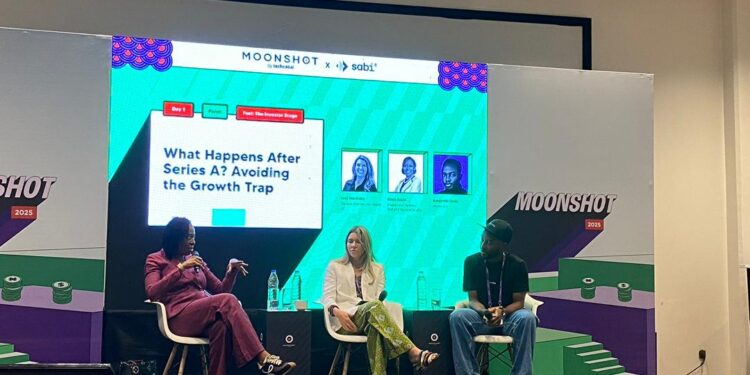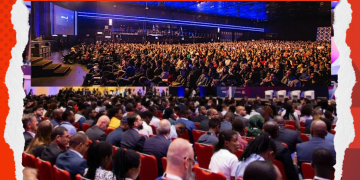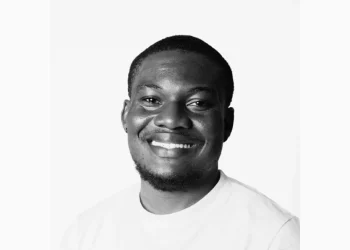Day one of Moonshot 2025 in Lagos was a statement of intent. From the moment the halls opened, it was clear this was not another “come-for-the-freebies” tech conference. The rooms were full, the conversations were raw, and the deals being whispered in corners reminded us why this gathering matters: Africa’s innovation community is no longer waiting for permission to play global. It is already making bets bold enough to change the narrative.
Trust, Not Just Capital, Is Infrastructure
Interswitch Purepay’s Managing Director, Akeem Lawal, put it bluntly: Africa cannot scale on capital alone. Trust is the currency that underpins every infrastructure play. His keynote set the tone for the day, challenging startups, investors, and regulators to build systems where reliability is the first product. For an ecosystem too often obsessed with funding headlines, it was a refreshing shift of lens.
Leading Through the Pressures of Scale
Later in the day, a standout panel titled “Leading Through the Pressures of Scale” brought the reality of building at speed into sharp focus.
- Damian Okafor, Marketing Lead at Chowdeck, explained how scaling amplifies even the smallest cracks. Chowdeck now fulfills tens of thousands of orders per day, and if even 2 percent fail, thousands of customers will feel let down. With Series C funding recently secured, the pressure is real, but Damian insisted their focus is not on the noise, it is on building trust and ensuring Chowdeck is perceived as a company that cares deeply about every single order.
- Tobi Otokiti, VP of Product at Raenest, zoomed in on brand and product identity. Fresh from the launch of Geegpay, she revealed that many users do not even know Geegpay belongs to Raenest. That disconnect led to internal conversations about trust, transparency, and the alignment between product and brand. For Tobi, the next decade must be about building African products that don’t just exist globally but thrive globally, backed by strategy and clarity.
- Dumebi Iwuchukwu, Head of Design at Stears, described the design pressures that come with scale. He likened it to moving from street football to playing in the professional leagues: what worked in the early days no longer suffices as expectations rise. Design, he argued, is not just visual polish but the framework that communicates maturity, sophistication, and readiness to compete on bigger stages.
Together, their stories revealed the human side of scaling: sleepless nights, impossible expectations, and the relentless drive to deliver excellence, even when the stakes are brutally high.
Creative Economy: Beyond Inspiration, Toward Infrastructure
At the Creative Economy track, Odile Limpach and Eyram Tawia spoke with urgency about moving Africa’s creative industries from inspiration to infrastructure. Talent is abundant, they noted, but sustainability only comes when there is investment in skills, distribution, and pipelines. Their message resonated deeply: Africa cannot afford to lose another generation of creators to broken systems.
Government Voices: Partnership, Not Policing
Nigeria’s Minister of Industry, Trade and Investment, Jumoke Oduwole, walked into the spotlight with a clear call to action, startups must see government as a partner in market expansion, not an obstacle. Her remarks on building African partnerships to help Nigerian startups scale cross-border carried weight, particularly at a time when regulatory uncertainty often slows innovation. If taken seriously, this could mark a turning point in the state–startup relationship.
The Energy in the Halls
What struck us most from Techsoma’s vantage point was not just what happened on stage, but in the spaces between. Founders met for the first time and began sketching deals on napkins. Investors walked out of panels not to rest, but to pull out their phones and schedule follow-up meetings. The energy was electric, yes, but also purposeful. This was not networking for the sake of optics. It was real, alive, and urgent.
Editor’s Note
Moonshot 2025 Day One reminded us of something Techsoma has always believed: Africa’s tech story is not about isolated unicorns, it is about systems that work. Trust as infrastructure. Talent as currency. Governments as partners. And founders who refuse to settle for less.
From Chowdeck’s obsession with trust, to Raenest’s global product ambitions, to Stears’ design-for-scale mindset, the pressures are immense, but so is the vision.
Day one was only the opening act. The next few days will test whether these conversations translate into commitments. But one thing is certain, Africa is no longer chasing moonshots. It is building them.
















